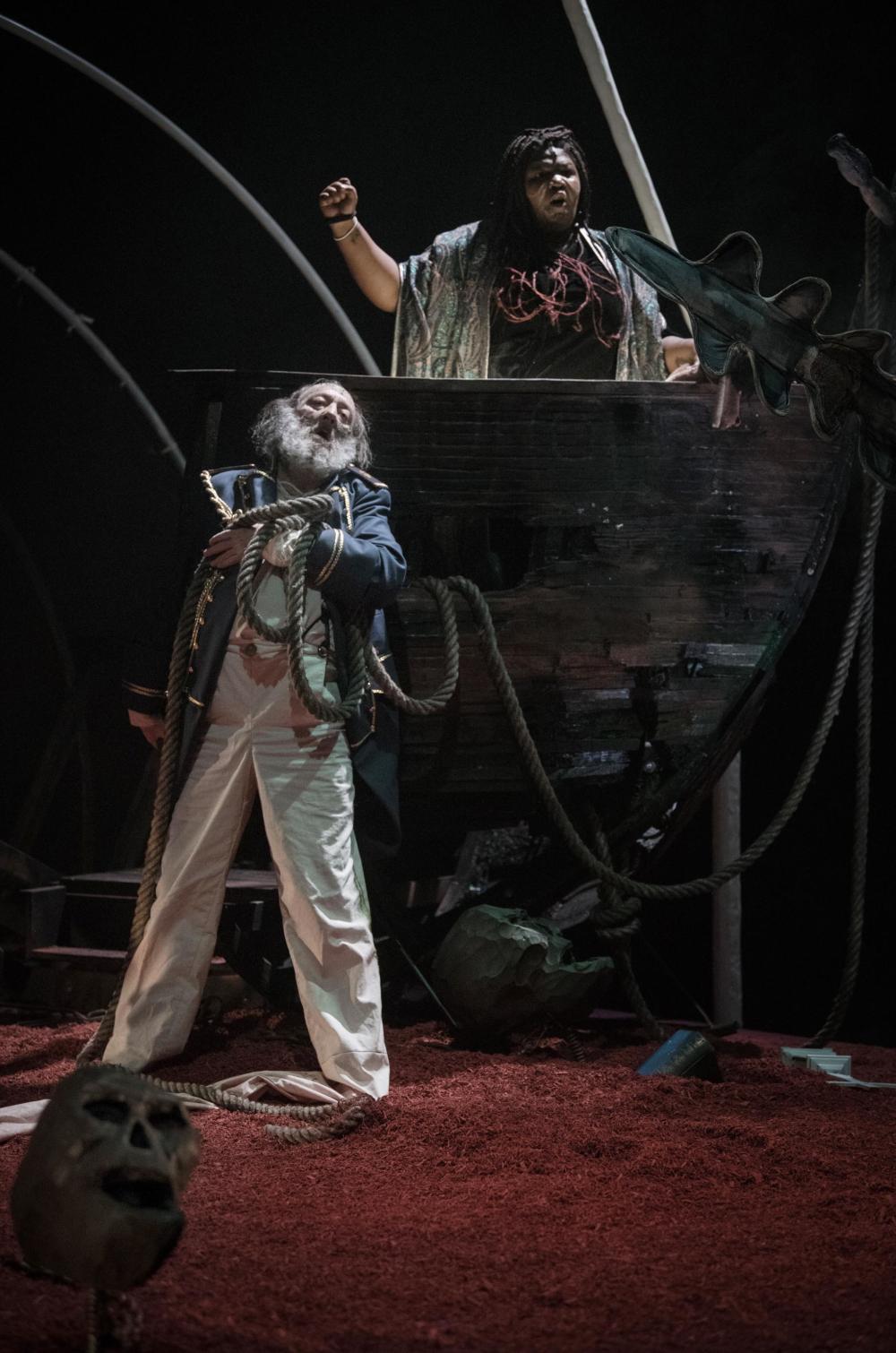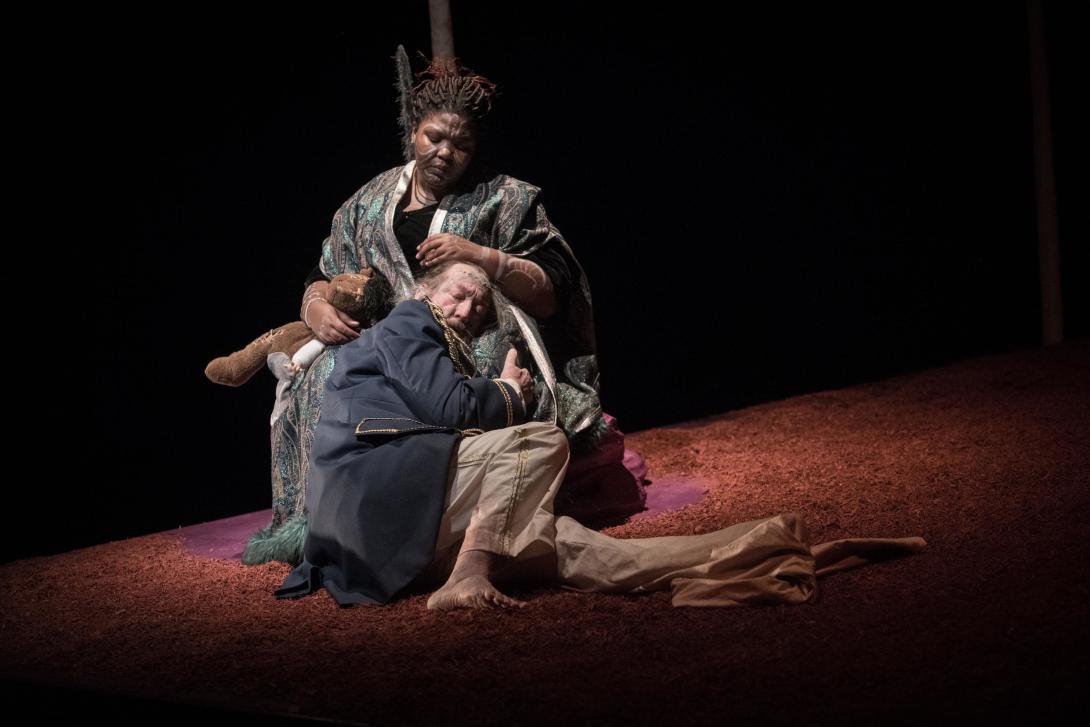Moby Dick
A MAGICAL-REALIST STORY ABOUT POWER AND DIFFERENCE
an interview with Gorges Ocloo, by Ciska Hoet.
It’s really going to swing.” Gorges Ocloo’s eyes light up when he talks about his upcoming production. Four years on from his much-lauded Medea project, this idiosyncratic theatre-maker is once again getting his teeth into a western classic: Moby Dick.
“I don’t think I’m very good at explaining what I want to make,” Ocloo laments a few times during our discussion. “I need images to bring my story to life. I need to get on with it rather than talk about it.” He paces restlessly across the room as he searches for words. Nevertheless an incredibly clear story emerges through his associations, seemingly without his being aware of this himself. Gorges Ocloo’s Moby Dick will be a jazzy opera about power, status and the need for rapprochement and discussion in our polarised society.
“The idea for this piece came from a photo in the newspaper of a young black girl who was floating in the water in her Sunday dress.” Ocloo explains. “I thought it was a bewitchingly beautiful image. Until I read the caption. The photo showed a drowned boat-refugee in the Mediterranean Sea. Although it looked as though she was peacefully sunbathing. I found it hugely moving.”
For some time now, Ocloo has been saying that he wanted to take on Herman Melville’s American classic. When he saw the photo, all the puzzle pieces suddenly fell into place. “I wondered whether the girl had been aware beforehand of the dangers of the journey she was about to undertake. Was she scared, or had she actually thought it was safe? Because of the dress, she looked like she was going on holiday. It made me think of the crew of the Pequod, the boat that sails off to its doom in Moby Dick as a result of Ahab’s vindictiveness. Would the fishermen still have gone if they had known that it was actually Ahab’s intention to hunt down the dangerous sperm whale Moby Dick? At the end of the book they all die.”
What made you choose Moby Dick?
“It’s one of those books that everyone has heard of but nobody has read (laughs). Of course, I was already familiar with the plot, about Ahab who obsessively hunts a whale and thus condemns everyone around him to death. Then I saw the 1956 film starring Gregory Peck. But it was only when I started reading the book myself that a whole world opened up to me. I already knew that it was a tough, 700-page novel, but the key thing I discovered was that it is one big, virtuoso metaphor for forces that are still at play in society today. Both the films and the short synopsis of the story we’re all familiar with are beside the point. The book is not about a whale at all.”
So what is it about?
“Various themes are woven into it. Personally I was immediately fascinated by the way the unknown takes shape in the text. The book dates from 1851, but nevertheless contains homoerotic scenes that come across as entirely ordinary. The narrator Ishmael winds up naked in bed with Queequeg, who subsequently becomes his best friend. Queequeg is described as a large, black, tattooed half-savage who sells human heads. This character contrasts sharply with the figure of Ahab, who symbolises the rich, powerful, white man. He does not appear in the first 150 pages, but people do talk about him. Then he emerges and announces that he wants to go fishing to catch a big whale. This is about power; about high and low, rich and poor.”
Your production is set after the boat has sunk: Ahab is waiting in purgatory for his place in the hereafter. There, a discussion takes place between him, Ishmael and Queequeg in which they look back at the past.
“It’s true that you won’t see the sea. The scene that I have in mind more closely resembles the desert-like, toxic landscape with which I’m familiar from the dried up Aral Sea on the border between Kazakhstan and Uzbekistan. We’ll be working with a single actor and a single singer. Josse De Pauw will be playing both Ahab and Ishmael. I previously worked with him on De Blinden, which he directed. For me, he is perfect for the role. He exudes power and has the kind of voice that really makes you sit up and listen (laughs). For the singing I’m still looking for a black female jazz singer. She will provide the energy. It’s going to be a performance that really swings .”
“The starting point is the question of how their relationship would look without all the earthly ballast, without status and power imbalance. They are dead and are waiting for the hereafter. Will Ahab continue to be a kind of demigod in the eyes of the quiet, exotic Queequeg? Will they unite? Or will they go looking for a new Moby Dick to hunt down?”
In your piece Scarlet-Anansi-Ocloo, you took on Medea to explore the phenomenon of the genocides. For you, Moby Dick is an opportunity to explore the balance of power.
“As a Belgian with Ghanaian roots, it’s exciting for me to adapt a Western classic and to give shape to what I read in it. I compare our yearning for progress to the feverish search for Moby Dick. Why do things always have to be bigger and better? If you’re never satisfied, you end up with a sick society from which morality disappears.”
“The relationship between black and white and rich and poor is also woven into the book. Everyone is dependent upon Ahab because he has the money. Queequeg just wants to live, but in order to do that, he has no choice but to work for Ahab. Ahab sits safely in his cabin all the time and lets his people know what he needs from there. In the meantime, he destroys everything with the arrogant notion that he is stronger than Moby Dick.”
You compare Ahab to the richest one per cent.
“It’s true, the character often makes me think of Trump. Pequod, the boat, is then a metaphor for the society that he destroys. If Trump wants to mine coal, we should actually be refusing, because it destroys our ecosystem. But of course we also have to live on something, and keep on paying our phone bills and our car loans. So we go along with it, just as the fishermen go along with Ahab. It is a food chain in which ‘the bottom’ is dependent on ‘the top’.”
Why do you want the characters to have a conversation after their deaths?
“I have a lot of questions about how we interact with one another. Will European leaders keep on saying that refugees and people of colour are destroying everything? And will Africans continue to resent Europeans for colonisation? I’m not saying that one is good and the other bad, but I long for a kind of rapprochement. Injustice makes me angry, but we cannot eternally keep on blaming others for everything. We have to be able to look one another in the eye and sincerely ask how things are going. I know that the one per cent is destroying everything, and I understand that this provokes violence, but I still want to carry on discussing things with everyone at a human level. What’s more, I’d like to be able to ask them if they regard their way of doing things as normal. I want to enter into discussion with people whose thinking is radically different from mine. This multiplicity of meanings is what makes a society so rich. I also embrace this multiplicity of opinions in the theatre. It is precisely these conflicting visions that ensure that something is created. That’s why I want these characters to exchange ideas with one another. Irrespective of status and ego, irrespective of the material: pure and unadorned. I want to find out what evolves as a result.”
Ben Okri will be taking care of the adaptation. Why did you choose him?
“I admire his work hugely and I want to incorporate his magic realism into the piece. He’s half-Nigerian and so, just like me, he’s in tune with voodoo and animalistic narratives. There is room for the supernatural in his writing, and for light and imagination. He paints a very poetic, fairy-tale world that I also want to conjure up in the performance. I love descriptive and imaginative texts. With them you create places where anything is possible. Theatre has that power too. For me, a great deal of truth lies beyond realism.”
Are there any other works that influenced you for this performance?
“I’ll be using excerpts from works such as Robinson Crusoe, and from Bartleby – a novella by Melville. But I’m also reading Bob Woodward’s book Fear, about Donald Trump. And there’s a poem by Lucebert that I want to use. In any way, it’s going to be a patchwork into which I will incorporate multiple references. Ben Okri will then help ensure that I don’t make it too hermetic (laughs).”

